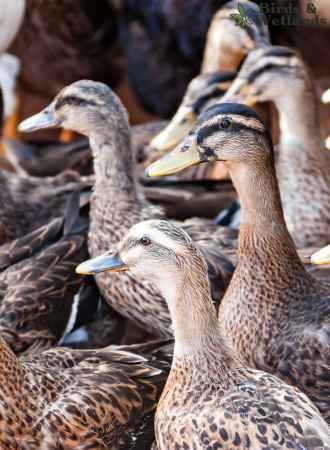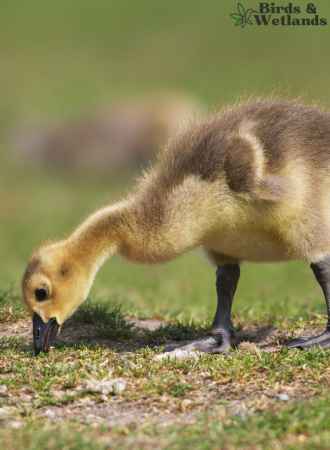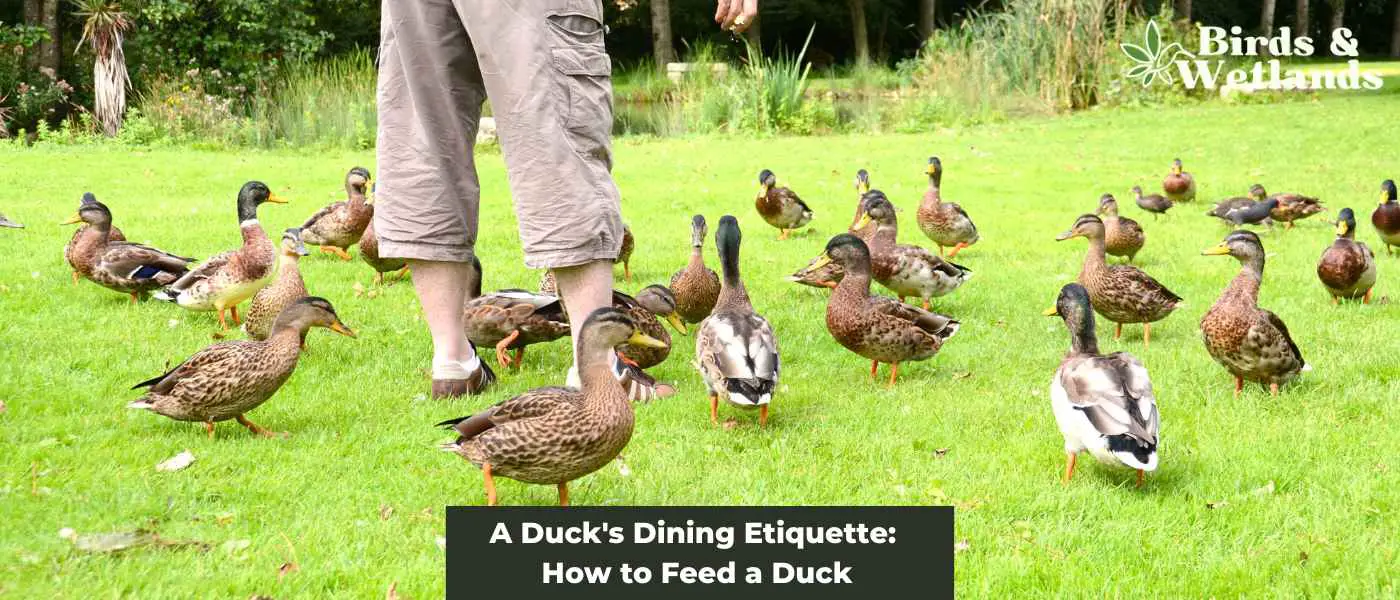Feeding ducks can be a delightful and rewarding experience for both the ducks and their caretakers. Ensuring that these charming birds receive the proper nutrients and enjoy a well-balanced diet is essential for their overall health and well-being.
In this guide, we’ll explore the ins and outs of a duck’s dining etiquette, from the types of food they should eat to the best practices for serving meals.
By following these guidelines, you’ll be well-equipped to provide your feathered friends with a nutritious and satisfying dining experience. So, let’s dive in and learn more about the art of feeding ducks!
Feeding a duck properly involves providing a balanced diet, maintaining cleanliness, and ensuring safety. Offer a mix of high-quality commercial duck feed and healthy treats like chopped vegetables, grains, and fruits. Keep their feeding area clean to prevent disease and spoilage. When feeding wild ducks, scatter food on the water’s surface or ground to avoid overcrowding and aggression.
Key takeaways:
- Provide a balanced diet with commercial feed and healthy treats
- Maintain cleanliness in the feeding area to prevent disease
- Scatter food for wild ducks to avoid overcrowding and aggression
What Ducks Eat
Feeding ducks can be a fun and rewarding experience, but it’s important to know what they should and should not eat. Ducks are omnivores, which means they eat both plants and animals. Their diet can vary depending on whether they are wild or domesticated, laying or non-laying, and what is available in their environment.
Wild Ducks
Wild ducks typically eat a variety of foods found in their natural habitat such as aquatic plants, insects, snails, and small fish. They also eat grains and seeds that are scattered on the ground or in the water. It’s important to note that feeding wild ducks bread or other junk food can be harmful to their health and the environment. These types of foods lack the necessary nutrients and can cause digestive problems for the ducks.

Pet Ducks
Pet ducks should be fed a balanced diet that includes a variety of foods. Duck feed can be purchased at most pet stores and should be the main source of their diet. This feed is specially formulated to meet the nutritional needs of ducks and can be purchased in different stages such as starter feed, growers pellets, maintenance feed, and layer feed.
In addition to duck feed, pet ducks can also be given treats such as mealworms, chopped lettuce, and small pieces of healthy fruits and vegetables. It’s important to limit the amount of treats given to prevent overfeeding and obesity.
Best Duck Feed Pellets
Are you a duck owner looking for the perfect feed to keep your feathered friends happy and healthy? Look no further than Purina Duck Feed Pellets! With their nutritionally balanced formula and high-quality ingredients, these pellets are the ultimate solution for providing your ducks with the nutrition they need to thrive.
Pros
- Complete Nutrition: Purina Duck Feed Pellets are nutritionally balanced to provide all the essential vitamins and minerals that ducks need to stay healthy and strong.
- Easy to Digest: The pellets are specially formulated to be easy to digest, which makes them ideal for ducks of all ages.
- Promotes Growth and Development: With its balanced nutrition formula, Purina Duck Feed Pellets are designed to support healthy growth and development in ducks.
- Suitable for All Breeds: Whether you have domestic ducks or wild ducks, Purina Duck Feed Pellets are suitable for all breeds of ducks.
- Trusted Quality: Purina has been producing high-quality animal feed for over 100 years, so you can trust that your ducks are getting the best possible nutrition with Purina Duck Feed Pellets.
Cons
- Cost: Compared to other types of duck feed on the market, Purina Duck Feed Pellets can be slightly more expensive. However, many customers feel that the high-quality ingredients and balanced nutrition formula are worth the extra investment.
- Pellet Size: Some customers have noted that the pellet size of Purina Duck Feed Pellets can be quite large, which may not be suitable for smaller or younger ducks. However, many customers have reported that the pellets can easily be broken up or soaked in water to make them easier to eat.
Laying Ducks
Laying ducks require a diet that is high in protein and calcium to support egg production. Layer feed can be purchased at most feed stores and contains the necessary nutrients for laying ducks. Calcium supplements may also be necessary if you notice consistent poor eggshell quality.

Non-Laying Ducks
Non-laying ducks can be fed a maintenance feed that is lower in protein and calcium than layer feed. This type of feed is designed to provide the necessary nutrients for ducks that are not laying eggs.
Feeding ducks can be a fun and rewarding experience, but it’s important to know what they should and should not eat. Ducks require a balanced diet that includes a variety of foods, and it’s important to limit treats to prevent overfeeding and obesity. By providing the right nutrition, you can help ensure that your ducks stay healthy and happy.
Healthy Feeding Habits
Feeding ducks is not just about providing them with food, it’s also about ensuring that they have a healthy diet. In this section, we will discuss some healthy feeding habits for ducks.
Healthy Ducks
Healthy ducks need a balanced diet that includes protein, vitamins, and minerals. Ducks that are fed a diet that is too high in carbohydrates, such as bread, can suffer from malnutrition and other health problems. To keep your ducks healthy, it is important to provide them with a balanced diet that includes a variety of foods.

Stop Feeding
It is important to stop feeding ducks if they are becoming a nuisance or if they are getting too much food. Overfeeding ducks can lead to obesity and other health problems. Feeding ducks in certain areas can lead to environmental problems, such as water pollution.

Too Much Food
Ducks should be fed an appropriate amount of food each day. Too much food can lead to obesity and other health problems. It is important to monitor the amount of food that your ducks are consuming and adjust their diet accordingly, removing any uneaten leftovers and avoiding bread products and other treats which are unhealthy.
Healthy Treats
Ducks love treats, but it is important to provide them with healthy treats that are good for them. Some healthy treats for ducks include fruits and vegetables, such as lettuce, spinach, peas, and blueberries. It is important to avoid feeding ducks bread, as it is not a healthy food for them.
Nutritional Value
Ducks require a balanced diet that includes protein, vitamins, and minerals. Some good sources of protein for ducks include insects, worms, and fish. It is also important to provide ducks with a source of calcium, such as crushed oyster shells, to help them maintain healthy bones and eggshells.
Feeding ducks a healthy diet is important for their overall health and well-being. Providing them with a balanced diet, monitoring the amount of food they consume, and offering healthy treats can help ensure that they stay healthy and happy.
Feeding Guidelines
Feeding ducks can be easy and enjoyable, but it’s important to know the right foods to give them and how much to feed. Here are some feeding guidelines to keep in mind when feeding adult ducks, young birds, and mother ducks.
Adult Ducks
When feeding adult ducks, it’s important to provide them with a balanced diet that meets their nutritional needs. A mature duck should consume between 170 to 200 grams (about six to seven ounces) of feed per day.
Ducks being raised as meat birds as well as especially large breeds being raised for eggs, such as the Jumbo Pekin breed, should have their daily feed ration increased by several ounces.
It’s best to use duck food formulated with at least 18-20% protein to feed adult ducks. Feed drakes and non-laying ducks a food blend with about 14% protein. A drake is a mature male duck. A non-laying duck refers to a female duck not currently producing eggs. Provide breeder food for your egg-laying ducks.

Young Birds
Young ducks require a higher protein diet than adult ducks. Feed them a starter feed with 20-24% protein for the first few weeks of life. After that, switch to a grower feed with 16-18% protein until they reach maturity.
Young ducks should eat approximately six to seven ounces (170 to 200 grams) of food daily once mature. If you are raising a particularly large duck breed, like the Jumbo Pekins, the feed ratio should be increased by an ounce or two.

Mother Duck
Mother ducks require more food than usual during the breeding season. They need extra protein to support the growth of their eggs and to maintain their own health. Feed them a breeder food with 16-18% protein during this time.

Uneaten Food
Ducks can be messy eaters, and it’s not uncommon for them to leave food uneaten. It’s important to remove any uneaten food from their feeding area to prevent it from attracting pests or spoiling.
Best Food
There are many different types of duck food available, including pellets, crumbles, and mash or even chicken feed. Pellets are a popular choice because they are easy to store and feed. However, some ducks prefer crumbles or mash, so it’s important to experiment and find out what your ducks like best.
Feeding ducks can be enjoyable and easy when you know the right foods to give them and how much to feed. By following these feeding guidelines, you can ensure that your ducks are healthy and happy.
Special Dietary Needs
Ducks have specific nutritional needs that must be met to ensure they remain healthy and happy. In addition to their daily diet, ducks require certain supplements to ensure they receive the necessary vitamins and minerals. This section will cover some of the special dietary needs of ducks.
Calcium Absorption
Calcium is essential for the health of ducks, especially for egg-laying females. However, calcium absorption can be a problem for ducks, particularly if they are not receiving enough Vitamin D. Without sufficient Vitamin D, ducks cannot absorb calcium properly, which can lead to thin shells and other health problems.
To ensure ducks receive enough Vitamin D, they should be given access to natural sunlight or a UVB light. Ducks should be provided with calcium supplements, such as oyster shells, to ensure they receive enough calcium.
Thin Shells
Thin shells can be a common problem for ducks, particularly for egg-laying females. Thin shells can be caused by a variety of factors, including a lack of calcium, Vitamin D deficiency, and stress.
To prevent thin shells, ducks should be given access to calcium supplements, such as oyster shells, as well as Vitamin D. Ducks should be provided with a stress-free environment, which can help reduce the likelihood of thin shells.

Duck’s Eggs
Duck eggs are a nutritious and delicious addition to any diet, but they require a bit of extra care when it comes to feeding. Duck eggs are larger than chicken eggs and require more calcium to form a strong shell. Duck eggs are higher in fat and protein than chicken eggs.
To ensure ducks produce healthy eggs, they should be given access to calcium supplements, such as oyster shells, as well as a diet that is high in protein and fat. Ducks should be provided with a stress-free environment, which can help ensure they produce healthy eggs.
Oyster Shells
Oyster shells are an excellent source of calcium for ducks and should be provided as a supplement to their daily diet. Oyster shells are also a great way to ensure ducks receive enough calcium to form strong eggshells.
When providing oyster shells, they should be crushed or ground into small pieces to ensure they are easy for ducks to consume. Oyster shells should be provided in a separate container from their regular food to ensure ducks have access to them whenever they need them.

Best Waterfowl Feed
Delightful Feeding Experience
Transform your backyard into a scenic waterfowl habitat and enjoy an interactive feeding experience with Natural Waterscapes Waterfowl Floating Food.

Pros
- Nutritious Food: Natural Waterscapes Waterfowl Floating Food is specifically designed to provide essential nutrients to waterfowl, including swans, geese, and ducks, helping them maintain a healthy diet.
- Convenient: The food comes in resealable packaging, making it easy to store and use as needed. It is also easy to handle and transport.
- Floating Formula: The floating formula of the food allows it to remain on the surface of the water, making it easier for waterfowl to eat and minimizing the risk of water contamination.
- Attracts Waterfowl: The food is formulated to attract various waterfowl species, including swans, geese, and ducks, to your pond, lake, or other water body, providing an opportunity to observe and enjoy these beautiful creatures.
- Environmentally Friendly: Natural Waterscapes Waterfowl Floating Food is made with environmentally friendly ingredients and does not contain any harmful preservatives, making it safe for both waterfowl and the environment.
Cons
- Shelf Life: The food’s shelf life may be limited compared to other types of waterfowl food due to its natural ingredients and lack of preservatives. This means you may need to use it up quickly after opening the package to prevent it from going bad.
Foods to Avoid
When it comes to feeding ducks, there are certain foods that should be avoided. Here are some of the foods that should not be fed to ducks:
Junk Food
Feeding ducks junk food with low nutrient content and high calories is not recommended. This includes foods like potato chips, crackers, popcorn, and cereal. These foods can be harmful to ducks and may cause them to become overweight or malnourished.
Bread
Contrary to popular belief, bread is not a suitable food for ducks. It lacks the necessary nutrients that ducks need to maintain a healthy diet. Bread can cause digestive problems for ducks, leading to malnutrition and even death.
Citrus Fruits
Citrus fruits like oranges, lemons, and grapefruits should not be fed to ducks. These fruits contain high levels of acid, which can cause digestive problems for ducks. The high sugar content in citrus fruits can be harmful to ducks and may cause them to become overweight.
Nightshade Family
Foods in the nightshade family, such as potatoes, tomatoes, and eggplants, should also be avoided. These foods contain a toxic substance called solanine, which can be harmful to ducks. Raw dried beans, spinach, and iceberg lettuce should be avoided as they can cause digestive problems for ducks.
When feeding ducks, it is important to avoid foods that are high in calories, lack nutrients, or can be harmful to their digestive system. By following these guidelines, you can ensure that the ducks in your area remain healthy and well-fed.
Feeding Other Waterfowl and Birds
Feeding waterfowl and birds can be a fun and rewarding experience. However, it is important to feed them the right kind of food to ensure their health and well-being. Here are some tips on feeding different types of waterfowl and birds:
Geese
Geese are larger birds and require more food than ducks. They are herbivores and feed on grasses, grains, and seeds. It is best to feed them cracked corn, wheat, and barley. You can also feed them leafy greens like lettuce, kale, and spinach. It is important not to feed them bread or other junk food as it can cause health problems.
Other Ducks
Other ducks, such as Muscovy ducks, have different dietary needs than mallards. They are omnivores and feed on a variety of foods, including insects, worms, and small fish. You can feed them cracked corn, wheat, and barley, as well as leafy greens like lettuce, kale, and spinach. It is important not to feed them bread or other junk food as it can cause health problems.
Other Waterfowl
Other waterfowl, such as swans and coots, have different dietary needs than ducks and geese. They are primarily herbivores and feed on aquatic plants and grasses. You can feed them leafy greens like lettuce, kale, and spinach, as well as aquatic plants like duckweed and water hyacinth. It is important not to feed them bread or other junk food as it can cause health problems.
Other Wild Birds
Other birds, such as pigeons and doves, have different dietary needs than waterfowl. They are primarily seed eaters and feed on a variety of seeds, including sunflower seeds, millet, and cracked corn. You can also feed them fresh fruits like apples and berries. It is important not to feed them bread or other junk food as it can cause health problems.
Larger Waterfowl
Larger waterfowl, such as pelicans and swans, have different dietary needs than smaller waterfowl. They are primarily fish eaters and feed on a variety of fish, including small minnows and larger fish like trout and salmon. You can also feed them leafy greens like lettuce, kale, and spinach. It is important not to feed them bread or other junk food as it can cause health problems.
Feeding waterfowl and birds can be a fun and rewarding experience, but it is important to feed them the right kind of food to ensure their health and well-being. Always avoid feeding them bread or other junk food, and instead opt for healthy options like leafy greens, grains, and seeds.
FAQs on How to Feed Ducks
What is the proper way to feed ducks?
Feeding ducks properly is essential for their health and well-being. Provide a balanced diet that includes a high-quality, waterfowl-specific feed or poultry pellets, along with fresh fruits, vegetables, and leafy greens. Never feed ducks bread, as it lacks the necessary nutrients and can be harmful to their health.
Do you put duck feed in water?
While it is not necessary to mix duck feed with water, ducks do benefit from having access to clean water while eating. Ducks use water to help moisten their food, making it easier for them to swallow. Providing a shallow dish or pan of water near the feeding area will allow ducks to dip their food in water as they eat.
Do you feed ducks in a bowl?
Feeding ducks in a bowl can be a practical and hygienic method for providing food. Using a shallow dish or a wide, low-sided container can make it easier for ducks to access their feed. Be sure to clean the bowl regularly of any leftover food to prevent the buildup of mold and bacteria, which can be harmful to your ducks’ health.
How many times a day should I feed my backyard ducks?
If you are raising ducks, they should be fed at least twice a day, with younger ducklings requiring more frequent feedings. Providing a consistent feeding schedule will help ensure that your ducks receive the proper nutrition they need to thrive.
Be mindful not to overfeed your ducks, as obesity can lead to various health issues. Monitor their weight and adjust their food intake as needed to maintain a healthy weight. You can feed them chick feed if you have a mixed flock or their favorite frozen peas, or even some pelleted feed formulated for ducks. A great treat for them is meal worms, rolled oats or shrimp which are all great for their long term health.


